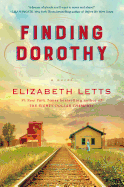
| Publisher: | Ballantine Books | |
| Genre: | Women, General, Biographical, Fiction, Historical | |
| ISBN: | 9780525622109 | |
| Pub Date: | February 2019 | |
| Price: | $28 |
| Fiction |
by Elizabeth Letts
Elizabeth Letts's enchanting historical novel, Finding Dorothy, beautifully combines the 1930s story of a beloved film with the real-life story of a woman in the late 19th century.
In 1938, 77-year-old Maud Baum, widow of L. Frank Baum, wheedles her way into the production of The Wizard of Oz, based on her husband's famous book, determined to keep the movie in line with Frank's vision. On set, she hears a song about a rainbow that she knows Frank would love, yells when she sees Emerald City painted green and meets a 15-year-old girl named Judy, whom she is determined to protect, since she couldn't protect the real Dorothy.
In a parallel narrative, Maud is a 10-year-old child in 1871 New York State. Her mother, Matilda, is a well-known suffragist and friend of Susan B. Anthony (Auntie Susan, to Maud). Maud grows up to be a strong, independent woman and one of the first female students to attend Cornell University. She meets Frank, they marry, travel far and wide with Frank's theater company and later settle in South Dakota to raise their family.
The author moves back and forth between the two stories, often directly connecting the dots between what's happening on the set of the movie and the details of Maud and Frank's lives that made their way into The Wonderful Wizard of Oz. Seeing these connections is delightful and the behind-the-scenes look is fascinating, but Maud's life story is just as compelling as the Hollywood one. --Suzan L. Jackson, freelance writer and blogger at Book By Book
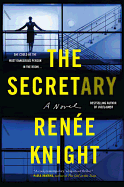
| Publisher: | Harper | |
| Genre: | Women, Psychological, Suspense, Thrillers, Fiction | |
| ISBN: | 9780062362353 | |
| Pub Date: | February 2019 | |
| Price: | $26.99 |
| Fiction |
by Renée Knight
After doing time as a temp, 25-year-old Christine Butcher can hardly believe her good fortune when glamorous Mina Appleton, heir to the Appleton's supermarket chain, asks Christine to be her full-time secretary. The job includes managing every aspect of Mina's life, professional and personal. And the number one quality Mina demands of her secretary? Loyalty.
It seems an easy price to pay since the job comes with heady perks, and Christine enjoys keeping her boss happy. But the hours get longer and she misses her young daughter's school play. And then Christine's father is hospitalized but she must accompany Mina on a business trip. When Mina is investigated for shady business practices, Christine needs to decide how far she'll go to protect the woman who has given her everything.
Though different in tone and subject from her stellar debut, Disclaimer, Knight once again excels at creating complicated female characters who keep readers unbalanced. Christine observes of her boss: "Like a fox, she is prepared to destroy, even when she's not hungry... she'll still trash the coop for the sport of it." And yet, "I was proud to march by her side." Christine starts out honest and bright-eyed, but her ethical boundaries become gradually porous over 18 years in Mina's employ. Mina's manipulation is so insidious, Christine never even considers saying no to her. Or does she? The unassuming secretary knows all of her boss's dirty secrets, so who actually has the power? Their relationship becomes increasingly toxic, yet remains so compelling that readers will race through the pages to see if both will survive it. --Elyse Dinh-McCrillis, blogger at Pop Culture Nerd
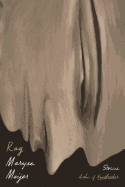
| Publisher: | FSG Originals | |
| Genre: | Short Stories (single author), Literary, Fiction | |
| ISBN: | 9780374246235 | |
| Pub Date: | February 2019 | |
| Price: | $15 |
| Fiction |
by Maryse Meijer
Reading Maryse Meijer's (Heartbreaker) short fiction is transformative. Stunning and evocative, Rag's 14 stories dazzle with brilliance while taking the reader's heart and wringing it dry--but not before delivering a solid literary punch. It is feeling perhaps shared by Meijer's deeply flawed characters during their quests for often elusive connection with others.
In the opening story, "Her Blood," a young woman who suffers a miscarriage in a pizzeria draws closer to the employee who witnessed the aftermath. A boy who gives mouth-to-mouth resuscitation to another male swimmer in "Pool" becomes obsessed with the sexual feelings awakened by the incident. In "Alice," a mother feeds her 12-year-old daughter excessive amounts of meat while simultaneously starving her husband.
Meijer is wildly innovative with her fiction and doesn't limit herself to exploring connection from solely a human point of view. "Good Girls" is told from the perspective of a man reincarnated as an attention-seeking dog, showing the deadly consequences of being too needy. In the title story, a personified household rag reflects on its shifting roles, from cleaning tool to murder weapon. ("Such a delight, to be manipulated by them. My beloveds. Sped further along the path of my undoing, every hour becoming softer and softer, thinner, more sensitive, wiser.")
Deliciously manipulative and psychologically haunting, Rag signifies Maryse Meijer as a master of the short form who consistently shocks and connects by delivering the unexpected. --Melissa Firman, writer and blogger at melissafirman.com.
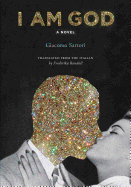
| Publisher: | Restless Books | |
| Genre: | Humorous, General, Satire, Literary, Fiction | |
| ISBN: | 9781632062147 | |
| Pub Date: | February 2019 | |
| Price: | $17.99 |
| Fiction |
by Giacomo Sartori, trans. by Frederika Randall
Giacomo Sartori's I Am God (translated from the Italian by Frederika Randall) skewers religion, science and love through observations from the Almighty himself. God is moved to "describe my existence... in clumsy human language" through diary entries.
God is obsessed with Daphne, a scientist who is also a promiscuous, cross-burning atheist. He tries to remain neutral as he watches her (although strange accidents happen to the attractive scientist interested in her). God finally admits to himself, "It's not clear my appreciation for her is one hundred percent divine."
God diverts his attention with visits to the outermost reaches of the cosmos. "Not even the divine eye... can ever have its fill of the infinite variety of shapes and unending metamorphoses, the ever-changing choreographies that give life to its farraginous complexity." But he returns, again, to humankind. "They bug me, that barbarous cult of technology of theirs and their contempt for things that matter; they enrage me... but I can't stop looking at them." Daphne, however, is unaware of divine interest. Her job and relationships with friends and lovers preoccupy her thoughts. When she finally confronts the reason for her hatred of the church, God--"fed up" with humans--says, "The time has come to extinguish them."
I Am God is compulsively readable, with passages so crisp and funny that readers will want to read them aloud. Sartori, an Italian scientist, has written a book that, beyond its philosophical wit, draws attention to hypocrisy in all forms. --Cindy Pauldine, bookseller, the river's end bookstore, Oswego, N.Y.

| Publisher: | Nightwood Editions | |
| Genre: | Short Stories (single author), Humorous, General, Literary, Fiction | |
| ISBN: | 9780889713390 | |
| Pub Date: | February 2018 | |
| Price: | $19.95 |
| Fiction |
by Catriona Wright
Catriona Wright's debut short story collection, Difficult People, examines the ways women behave in families, in relationships and with each other.
In "The Emilies," a lonely young woman blames her awkwardness on her namesakes, Emily Brontë, Emily Dickinson and Emily Davison, unmarried recluses and feminist icons: "Whenever Emily is stuck in some expanding moment of socially induced panic... she tells herself not to worry; it's just a case of The Emilies." It's a genius name for a familiar discomfort and a perceptive story about figuring out how to forge adult relationships. "Major Prude" is particularly timely and affecting, as the narrator refuses to take seriously her wild friend's rape allegations. And in the title story, "Difficult People," a woman attends a corporate seminar on enthusiasm soon after her eccentric brother's death. The story highlights the standards people--particularly women--must uphold to attempt not to make others uncomfortable: "I take a moment to remind myself to smile, to participate but not in an overbearing way, to be cheerful not cloying, assertive not strident, to be a team player, and under no circumstances to mention Devon." Later, she reminds herself: "Be positive, be proactive. Try harder."
The title story highlights what each selection confirms. Wright's characters don't seem so difficult after all, especially for fiction. While they may make mistakes, the things they strive for are mostly common--work, friendship, love, correct grammar on public signage, success in open-mic stand-up comedy, the experience of motherhood. Readers may find themselves questioning whether it's really the people who are difficult or, instead, the world around them. --Katy Hershberger, freelance writer and bookseller
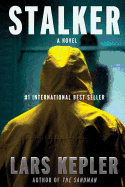
| Publisher: | Knopf | |
| Genre: | Psychological, Crime, Suspense, Thrillers, Fiction | |
| ISBN: | 9781524732264 | |
| Pub Date: | February 2019 | |
| Price: | $27.95 |
| Mystery & Thriller |
by Lars Kepler, trans. by Neil Smith
Stockholm is up against a serial killer with an idiosyncratic method: the murderer sends the police a link to a video showing a woman at home and unaware that she's being watched, and not long afterward she is fatally maimed. After a third woman's body is found, detective Margot Silverman, who is handling the case, notes, "The level of brutality... appears to have extended far beyond the moment of death."
The killer's style recalls that of the Rebecka Hansson murder almost a decade earlier. Rebecka's death was attributed to Rocky Kyrklund, a priest who had a drug habit and has since been in a psychiatric hospital. The hospital staff insists that Rocky couldn't have escaped to commit the new crimes, bolstering psychiatrist Erik Maria Bark's fear that nine years ago he ensured that the real killer would remain free to murder again: when Erik did Rocky's psych evaluation all those years ago, he didn't believe the man's alibi, so he didn't pursue it.
As in the other books in the superb Joona Linna series, credited to Lars Kepler, a pseudonym of the wife-and-husband team Alexandra Coelho Ahndoril and Alexander Ahndoril, there's not an ounce of flab on Stalker despite its heft, which accommodates both scrupulous character development and elaborate scenes of derring-do. Fans of the series will be rewarded for their patience awaiting the appearance of detective Joona Linna; of course, given the conclusion of Stalker's predecessor, The Sandman, they'll be wondering how he will return and in what capacity. --Nell Beram, author and freelance writer
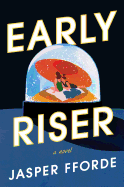
| Publisher: | Viking | |
| Genre: | Dystopian, Fantasy, Contemporary, General, Thrillers, Fiction | |
| ISBN: | 9780670025039 | |
| Pub Date: | February 2019 | |
| Price: | $28 |
| Starred | Science Fiction & Fantasy |
by Jasper Fforde
In Jasper Fforde's (The Eyre Affair, The Woman Who Died a Lot) wonderfully weird dystopian thriller, the human population spends four months hibernating every winter, the Hib. The deadly cold of winter exacts a toll of lives. To offset population losses, citizens must engage in mandatory childbearing. Class differences affect chances of surviving the Hib. The rich can afford Morphenox, a drug that saves energy by suppressing dreams and increases their survival rate, while the poor die in greater numbers. However, Morphenox users can suffer a neural collapse and awaken as zombie-like nightwalkers. Some nightwalkers retain just enough awareness to do menial labor, but most are "parted out" as organ and limb transplant sources.
In this bleak world, young Welshman Charlie Worthing has just embarked on an unusual career with the Winter Consulate, the determined and possibly insane few who stay awake to keep the sleepers safe. Despite its high mortality rate, the post comes with guaranteed Morphenox and gets him out of his dead-end job. After a nightwalker retrieval gone awry leaves his mentor dead, Charlie must guard himself against posh but homicidal Villains, the probably-but-maybe-not-mythical creatures known as Wintervolk, and his supposed allies. When he stumbles into a conspiracy centered on a viral dream that drives people to insanity and murder, Charlie isn't sure who to trust. He's started having the viral dream, too, and if he can't unlock its secrets quickly, this winter will be his last.
As precisely built as an ice sculpture, Fforde's wintry nightmarescape glistens with mystery and menace. Early Riser will leave Fforde's fans even more hopeful that he returns to a steady publishing schedule. --Jaclyn Fulwood, blogger at Infinite Reads
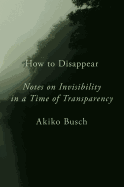
| Publisher: | Penguin Press | |
| Genre: | Nature, Biography & Autobiography, Art, Human Geography, Personal Memoirs, General, Subjects & Themes, Social Science | |
| ISBN: | 9781101980415 | |
| Pub Date: | February 2019 | |
| Price: | $26 |
| Starred | Social Science |
by Akiko Busch
Humanity's transition into the digital age has led to concerns about the impact on peoples' psychological well-being and the state of privacy. As the world grows ever more connected, it's imperative that voices preaching caution without hyperbole come to the fore. How refreshing, then, to read Akiko Busch's How to Disappear: Notes on Invisibility in a Time of Transparency, which perfectly threads the needle. Neither panic-stricken nor naïve, Busch sets out to find places where people can still become invisible and how artists, scientists and activists have created opportunities for people, both literally and figuratively, to disappear.
That combination of literal and figurative is important, and not as hard and fast as it may seem at first. The most interesting subjects in How to Disappear are the liminal spaces. Grand Central Terminal is one, where so many people come together and move past each other in self-organizing, self-less ways that a cloak of anonymity falls on the entire collective in action. "Disappearing into" or "becoming one with" the crowd are forms of self-effacement and are just as interesting subjects to Busch as the people trying to develop a real-live invisibility cloak. How to Disappear, despite its name, isn't interested in providing a roadmap for getting off the grid, but in exploring the various ways humans do disappear, whether it's from view or simply into themselves. Readers expecting a hard and fast set of conclusions may prefer to steer clear of this thoughtful, philosophical work. But those interested in joining Busch on her wanderings and ponderings will find much to mull over in How to Disappear. --Noah Cruickshank, director of communications, Forefront, Chicago, Ill.
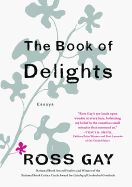
| Publisher: | Algonquin | |
| Genre: | Biography & Autobiography, Inspiration & Personal Growth, Body, Mind & Spirit, Personal Memoirs, Literary Collections, Social Science, African American Studies - General, Cultural, Ethnic & Regional, African American & Black, Essays, Ethnic Studies | |
| ISBN: | 9781616207922 | |
| Pub Date: | February 2019 | |
| Price: | $23.95 |
| Essays & Criticism |
by Ross Gay
Delight, according to poet Ross Gay, is underrated: its very existence, the multiplicity of delights present in the world, the noticing and celebrating of said delights. Between his 42nd and 43rd birthdays, Gay decided to capture as many delights as possible, and spin them out into a series of "essayettes." The result, The Book of Delights, is a kaleidoscopic collection of joy--an accumulation of blessings that, piled up, create a larger enchantment.
Gay (Catalog of Unabashed Gratitude) renders his delights in joyous, rambling prose: the whirring wings of a hummingbird, the Rothko-like effect of a weathered wooden backboard, the multi-layered affection of nicknames. His delights often take him to unexpected places, as when "Infinity" leads to a handmade lavender scarf and a new approach to masculinity: "I want to be softer, I'm trying to say."
In multiple essays, Gay addresses the complications of seeking and relishing delight as a black American, from the ritual of what he calls "The Negreeting" to the fact that his celebration of delight, as a black man, is a deliberate stand against "the commodification of black suffering." As the joys pile up--there's even an essay on "stacking delights"--Gay finds his delight radar growing more sensitive, his eyes and soul ever more attuned to good, to light, to wonder, to joy. Readers may find themselves pulling out actual pen and paper (another delight) to capture their own enchantments, or--at the very least--relishing every page of Gay's warm, wise, utterly captivating collection. --Katie Noah Gibson, blogger atCakes, Tea and Dreams
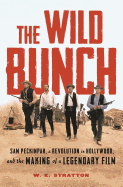
| Publisher: | Bloomsbury | |
| Genre: | History & Criticism, Film, Performing Arts | |
| ISBN: | 9781632862129 | |
| Pub Date: | February 2019 | |
| Price: | $28 |
| Performing Arts |
by W.K. Stratton
When Sam Peckinpah's The Wild Bunch hit movie screens 50 years ago, it revolutionized the western genre. In contrast to family-friendly films like True Grit and Butch Cassidy & the Sundance Kid, The Wild Bunch shocked and divided critics and moviegoers with its outrageous slow-motion scenes of violence. W.K. Stratton (Dreaming of Sam Peckinpah) details how Peckinpah's seminal and visceral film originated and how the amped-up violence reflected the country's mood during the Vietnam War and college protests. Moreover, it explores ways the film challenged and overcame limitations enforced on 1960s filmmakers.
Stratton offers concise and perceptive background information on the explosive director's earlier career. When Lee Marvin dropped out of the movie shortly before filming began, the filmmakers convinced William Holden to join Robert Ryan, Ernest Borgnine, Edmund O'Brien and Warren Oates as the aging group of outlaws and bounty hunters hoping to make one final score by robbing a U.S. army train. Peckinpah and Holden were known as blackout drinkers, but both swore off alcohol during the shooting. Stratton does an outstanding job highlighting the essential contributions of composer Jerry Fielding, cinematographer Lucien Ballard and editor Lou Lombardo.
Stratton loves The Wild Bunch (he succinctly writes, "I've never seen a better movie"), but this is not a gushing fan letter. Stratton's meticulous research, exhaustive interviews and scholarship all combine to create a fascinating portrait of a maverick filmmaker working at the top of his game and pushing the boundaries of moviemaking. --Kevin Howell, independent reviewer and marketing consultant

| Publisher: | Salaam Reads | |
| Genre: | Mental Illness, General (see also headings under Social Themes), Family, Social Themes, Young Adult Fiction, Prejudice & Racism | |
| ISBN: | 9781534426085 | |
| Pub Date: | February 2019 | |
| Price: | $18.99 |
| Starred | Children's & Young Adult |
by Hanna Alkaf
With her debut young adult novel, The Weight of Our Sky, journalist Hanna Alkaf provides heart-pounding, graphic insight into the seismic life shifts experienced by residents of Kuala Lumpur in the days directly following the May 1969 Malaysian Riots.
For 16-year-old Melati Ahmad, her obsessive-compulsive disorder (OCD) manifests as "the Djinn" who promises immediate, gruesome demises for her loved ones if she doesn't complete cycles of counting. If she complies, she is rewarded with brief moments of clear conscience. But all the horrors dreamed up by the Djinn jump from existing only in her mind to occurring in real time when rioting between Malay and Chinese residents breaks out in the streets and Mel is separated from her best friend, Safiya. When Auntie Bee, a Chinese woman, provides a narrow escape for Mel, a Malay, a bold portrait of her existence--lived at the mercy of the Djinn--begins to form.
The varied components of Mel's personal story and Kuala Lampur's history are all deftly folded into the main narrative, which maintains a steady, strong pace throughout. The author provides a straightforward note in the beginning with historical background about the lack of resources to support people with OCD and she issues warnings for "graphic violence, death, racism, OCD, and anxiety triggers." That note sets the tone, and readers move forward through Mel's heartrending but necessary internal transformation. A central point of Alkaf's work is voiced by Mel as she stands in the gap between warring factions, exemplifying the principle, "where we plant our feet is where we must hold up the sky... we live and die by the rules of the land we live in." Mel says, "We make our own sky, and we can hold it up--together." --Breanna J. McDaniel, freelance reviewer
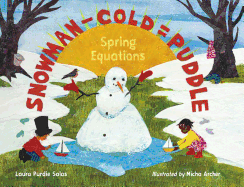
| Publisher: | Charlesbridge | |
| Genre: | General, Juvenile Fiction | |
| ISBN: | 9781580897983 | |
| Pub Date: | February 2019 | |
| Price: | $16.99 |
| Children's & Young Adult |
by Laura Purdie Salas, illust. by Micha Archer
Merging the sciences and arts, Meet My Family author Laura Purdie Salas explores the marvels of spring through (as she explains in her author's note) "combinations of words and symbols" that "are science." As Salas drops her readers into the water with eagles who "swoop down to scoop up tasty fish dinners" or hoists them up to the heavens where "constellations shimmer," she offers short, narrative explanations of her imaginative equations. A rainbow requires sunshine and rain, thus "sun - storm = rainbow"; bees are necessary for pollination so "bumblebees x flowers = blueberries." But the strikingly vivid equations are also something more. Remaining acutely aware of the environment and the emotions it evokes, Salas's equations "compress big ideas into small phrases, using unexpected or playful language." Simply, "they are poetry." This clever mixture of seemingly disparate disciplines explodes on the page in a celebration of spring and an awakening of senses.
Illustrator Micha Archer (Daniel Finds a Poem) brings the words to life with distinctive, charming oils and collage illustrations. The layered shapes and colorful patterns produce a palpable texture, and her dazzling colors pop. The audience can almost feel the breezes blowing kites or smell the perfume of the lilac through Archer's rich representations of the natural world.
Snowman - Cold = Puddle is proof that captivating stories exist in the wonders of the scientific realm. Salas invites her audience to finish the book's final equation for themselves, allowing each reader to see their world in a brand-new light. --Jen Forbus, freelancer
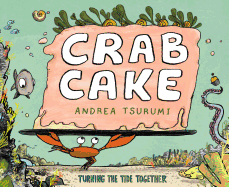
| Publisher: | Houghton Mifflin Harcourt | |
| Genre: | Animals, Humorous Stories, Recycling & Green Living, Environment, Marine Life, Nature & the Natural World, Social Themes, Self-Esteem & Self-Reliance, Juvenile Fiction | |
| ISBN: | 9780544959002 | |
| Pub Date: | February 2019 | |
| Price: | $17.99 |
| Children's & Young Adult |
by Andrea Tsurumi
"Under the sea, where sunlight touches sand, lies a place that's home to many incredible creatures." Among others, there's Clownfish, who enjoys hiding; Scallop, who swims in loops; and Crab, who, well, bakes cakes. (No, not crab cakes: the bakery kind. But with barnacles.) If the story's sea critters had eyebrows, they would be raised at Crab's decidedly uncrustacean-like behavior.
One night there's a "BIG SPLASH!"--a barge has dumped a mountain of garbage into the sea. While the other fish are experiencing psychic paralysis, Crab takes action, baking a cake that becomes a shared comfort food; it both fortifies the sea community and brings everyone together for a strategy session. Working collaboratively, the fish push or tote the garbage up to the dock and festoon it with the words (inked by Octopus, naturally) "COME/ GET/ YOUR/ JUNK!"
Crab Cake: Turning the Tide Together is a wackily wondrous "be yourself" book that doubles as an activism primer. Andrea Tsurumi, who presented multiple not-so-major disasters in the knee-slapper Accident!, never lets Crab Cake's ecological concerns obscure the book's humor. Her sea critters are all cute enough to be stuffies, even in the book's post-catastrophe grayscale scenes, in which the traumatized creatures aren't much more than googly eyes peeking out from hiding spots. Readers would do well to keep their own eyes peeled for Crab Cake's blink-or-you'll-miss-'em vignettes, as when an elder crab with a substantive shell glares at its shell-less charge and demands, "Well, where did you leave it?" --Nell Beram, freelance writer and YA author